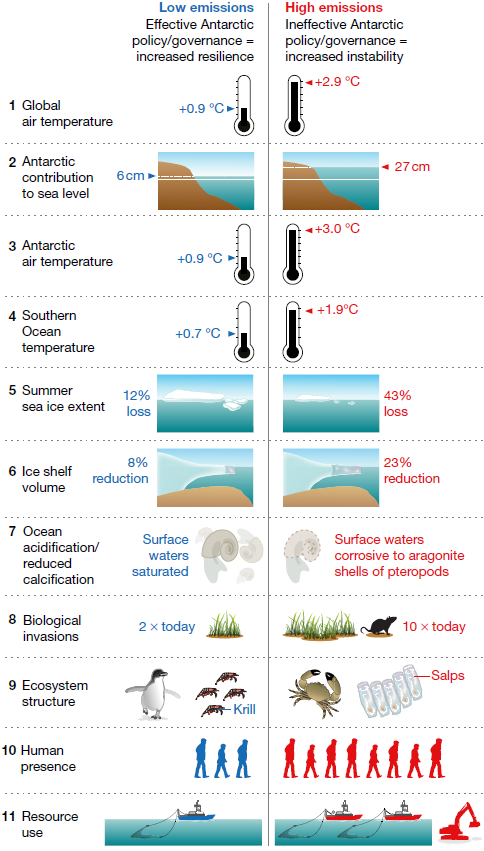This new study presents two possible narratives about the future of Antarctica and the Southern Ocean. Each narrative is seen through the eyes of an observer looking back from 2070 at what has occurred in the last fifty years. This approach highlights the long-term consequences of decisions made now and in the near future. The two scenarios describe plausible alternative futures rather than being forecasts.
High levels of greenhouse gas emissions …
In the first scenario, greenhouse gas emissions have remained unchecked, and global warming has been exacerbated. Very little action has been undertaken to mitigate the environmental and social factors that have an impact on Antarctica. Antarctica and the Southern Ocean have thus been affected by rapid and widespread environmental and climate changes, which in turn has consequences on the entire planet.
- In 2070, the oceans and the atmosphere have warmed, causing a significant loss of the major floating ice shelves, leading to both ice loss in the Antarctic Ice Sheet and sea level rise occurring at much faster rates.
- Environmental changes, including climate warming, retreating sea ice, and ocean acidification, have altered marine ecosystems.
- Uncontrolled growth in the exploitation of Antarctic resources has also caused environmental damage and introduced invasive species.
Lower levels of greenhouse gas emissions …
In the second scenario, greenhouse gas emissions have been reduced and an effective policy implemented that has mitigated anthropogenic pressure on the environment.
Thanks to such action, only moderate changes have affected Antarctica, which, in 2070, remains in much the same state as it was during the early decades of the 21st century.
- The floating ice shelves of Antarctica have remained more or less intact, which has kept the risks of rising sea levels to a minimum.
- Ocean acidification has been regulated and Antarctic ecosystems have generally remained intact.
- Anthropogenic pressure on Antarctica is regulated under an increasingly effective and collaborative international governance system.
Coordinated by Australian oceanographer Steve Rintoul[1], the authors of the study warn of the fact that what happens in Antarctica over the next fifty years will depend on the choices made now.
"Reducing greenhouse gas emissions in this decade is vital if we are to reduce the risk of irreversible change in the Southern Ocean, and prevent sea level rise accelerating due to destabilization of the Antarctic Ice Sheet," explained Valérie Masson-Delmotte, paleoclimatologist at the CEA[2] and French co-author of this international paper.
"The future of Antarctica is coupled to the future of the rest of the planet and to the future of human society. We must take measures now to slow down the rate of environment change, boost the resilience of the Antarctic and reduce the risk that we are causing irreversible changes that have a worldwide impact," M. Rintoul told us.
The authors, all winners of the prestigious Tinker-Muse Prize for their research on Antarctica[3], are experts in various fields, including Biology, Oceanography, Glaciology, Geophysics, Climate Science, as well as regulations regarding the environment.

Antarctica and the Southern Ocean in 2070, according to the 'low emissions / high action' (left) and 'high emissions / low action' (left) scenarios. Differences are relative to a 1986–2005 reference period.
© 2018 Macmillan Publishers Limited, part of Springer Nature.
[1] At the Centre for Southern Hemisphere Oceans Research (CSHOR) and the Antarctic Climate and Ecosystems Cooperative Research Centre (ACE CRC), in Hobart, Australia.
[2] At the LSCE (Laboratoire des Sciences du Climat et de l'Environnement, CEA-CNRS-UVSQ-IPSL)
[3] The Tinker-Muse Prize is awarded every year to an individual who has made a significant contribution in the field of science or policy that enhances our understanding of and/or the preservation of Antarctica. Inspired by Martha T. Muse's passion for Antarctica, the prize was founded following International Polar Year 2007-2008. Valérie Masson-Delmotte, Paleoclimatologist at the CEA, won the prize in 2015.